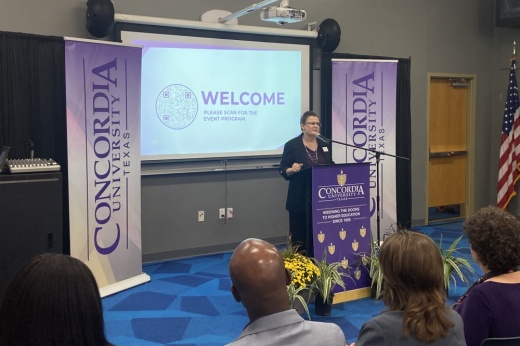The overview
Officials from Concordia University Texas, a private Christian university in Austin, unveiled a new initiative Oct. 25 to lower tuition, fees and textbook costs for traditional undergraduate students.
The Right Call Initiative will reduce tuition from $35,750 this school year to $23,500 for the 2024-25 school year. Tuition next school year will also cover all required fees for students such as general, course and graduation fees and textbook costs, said Kristi Kirk, Concordia University Texas provost and executive vice president.
As the average undergraduate student will pay $37,858 in tuition, fees and textbooks this school year, the new tuition structure will reduce overall costs for students by 38%.
“For many of our families, higher education feels out of reach; it feels unattainable, and we at Concordia are committed to changing that perception,” Kirk said. “We never want financial constraints to stand in the way of a family being able to access the dream of Christian higher education.”
The initiative will also provide personalized support for students by increasing financial literacy efforts and improving career-specific programs through additional certifications and internship opportunities, Kirk said.
The approach
The new approach to tuition will create greater transparency around the true cost of attendance, Kirk said. The university has historically charged high tuition rates while providing large scholarships and financial aid allocations, which can cause confusion for families and deter them from pursuing higher education, she said.
Concordia will now offer less scholarships and financial aid but reduce families' out-of-pocket expenses by lowering tuition and fees, Kirk said. She said the university will continue to offer some academic scholarships and need-based financial aid as well as accepting outside scholarships, including state and federal aid.
“It ultimately can reduce the out-of-pocket costs for families without costing us direct revenue,” Kirk said in an interview with Community Impact.
The impact
More affordable higher education will strengthen the workforce in Central Texas, specifically for first-generation students, said Cedrice Bennett, senior director of operations of E3 Alliance, a data-focused education collaborative.
“Our data shows us that a Central Texas student within six years of high school with no postsecondary credentials only has a 12% chance of earning a livable-wage job,” Bennett said.
Alison Alter, an Austin City Council member and a former college professor, spoke in support of removing barriers to higher education. She said developing the city’s workforce is one of her priorities.
“Making higher education more accessible helps develop our workforce and helps everyone have the opportunities we want them to have so they can succeed and be contributing members to our community,” Alter told Community Impact.





